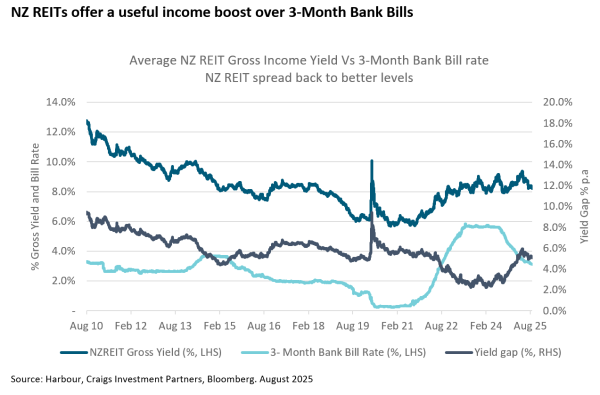- Stronger earnings and a helpful income boost relative to cash rates could help New Zealand (NZ) listed property securities – known as Real Estate Investment Trusts (REITs) – deliver better returns.
- New Zealand REIT returns have improved over the last year, and we believe that earnings and lower interest rates may continue to provide future support for the New Zealand REIT asset class returns.
Earnings growth: A turning point
New Zealand REITs have faced earnings headwinds over the last 5 plus years, but some of these headwinds may be turning into tailwinds.
New Zealand REIT earnings are sourced predominantly from rent on commercial real estate assets, including traditional office buildings, industrial warehouses and retail shopping centres. More recently, REIT investment has expanded into secular growth real estate sectors like digital infrastructure and healthcare real estate.
Over the last few years, investor confidence in rental income has been tested by post-Covid work patterns, shifting consumer behaviour, an economic slowdown, and changes in Government demand for space. While the demand picture will continue to evolve, a significant change that investors may have underestimated has been a reduction in the supply of new commercial property.
Higher construction costs, higher return hurdles, and limited tenant willingness to commit to new space has seen the development of new commercial property drop to low levels – lower than that required to meet NZ population growth. As a result, occupancy in higher-quality assets is better than many expected, and the time taken to release vacant space is shorter than expected.
Commercial property leases generally include structured annual rental increases. These increases tend to be fixed, or related to the rate of inflation. Structured rental growth should have supported earnings growth over the last few years, but this rental growth has been more than offset by higher costs. Higher interest rates have contributed to higher borrowing costs, and local authority rates and insurance costs (which can’t always be passed on to tenants) have increased at a pace well above rates of inflation. Some NZ REITs have also faced ongoing seismic resilience-related capital investment, which while important, does not always improve net property income. But some of these cost increases are now abating, with interest costs falling, and insurance cost growth showing signs of peaking.
The combination of better-than-expected property occupancy and falling costs should allow structured rental growth to do its job and support low, single-digit earnings growth for NZ REIT investors.
Income boost: A premium restored
With real estate fundamentals stabilising and the outlook for earnings improving, NZ REITs provide a useful risk-adjusted investment for income-focused investors. For a full 39% taxpayer, NZ REITs currently offer an average one-year prospective equivalent dividend income yield of over 8%. By comparison, the current 3-month bank bill is approximately 3%. As shown below, the 5% yield premium currently offered by NZ REITs over 3-month bank bills has returned to the average level seen since 2010.

In Harbour’s view, this yield boost provides income investors with an appropriate reward for investing in the higher risk NZ REIT asset class.
Harbour’s Real Estate Investment Fund provides an efficient way to benefit from this income boost. The Real Estate Investment Fund invests in a diversified portfolio of New Zealand and Australian REITs, with the objective of delivering sustainable near-term dividend income and medium-term capital growth, consistent with investing in a range of underlying real estate assets that benefit from secular growth trends.
IMPORTANT NOTICE AND DISCLAIMER
This publication is provided for general information purposes only. The information provided is not intended to be financial advice. The information provided is given in good faith and has been prepared from sources believed to be accurate and complete as at the date of issue, but such information may be subject to change. Past performance is not indicative of future results and no representation is made regarding future performance of the Funds. No person guarantees the performance of any funds managed by Harbour Asset Management Limited.
Harbour Asset Management Limited (Harbour) is the issuer of the Harbour Investment Funds. A copy of the Product Disclosure Statement is available at https://www.harbourasset.co.nz/our-funds/investor-documents/. Harbour is also the issuer of Hunter Investment Funds (Hunter). A copy of the relevant Product Disclosure Statement is available at https://hunterinvestments.co.nz/resources/. Please find our quarterly Fund updates, which contain returns and total fees during the previous year on those Harbour and Hunter websites. Harbour also manages wholesale unit trusts. To invest as a wholesale investor, investors must fit the criteria as set out in the Financial Markets Conduct Act 2013.